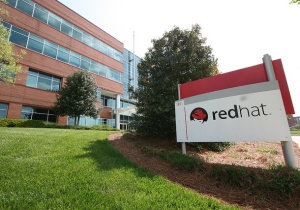Red Hat becomes first $1bn open-source company

Red Hat has become the first open-source company to surpass a billion dollars in yearly revenues, with the Linux specialist's earnings helped by broader use of its software in the public and financial sectors.

Red Hat has become the first open-source company to make more than $1bn in yearly revenue. Image credit: Red Hat
The company reported fiscal 2012 revenue of $1.13bn (£711m) on Wednesday, and fourth-quarter revenue of $297m, up 25 and 21 percent year-over-year respectively. The quarter's net income of $36m was marginally down on the previous quarter's $38.2m, but up on the previous year's $33.5m.
"Red Hat has become the first pure-play open-source company and one of a few select software companies to have ever achieved this [$1bn] milestone," the company's chief executive, Jim Whitehurst, said on an earnings conference call.
"We have credibility with telcos and financial services and government," he added. "Now [Red Hat's technology is] expanding out to a whole different set of workloads and use cases through those enterprises."
Over the past year, the company has released technologies to broaden its reach beyond enterprise servers and client computers and into cloud platforms, via its OpenShift platform-as-a-service (PaaS); its CloudForms cloud infrastructure; and its Gluster software-based scale-out storage technology, picked up via a $136m acquisition.
Whitehurst said the closest competitor to Gluster is EMC's Isilon technology. He noted that though Red Hat is yet to offer a commercial version of OpenShift, the PaaS has seen growth since its launch as a free beta in May.
"It's hard to put a specific growth rate on [OpenShift] because it started off at a very low base," he noted. "But we've had just tremendous week-over-week growth."
'De facto standard for enterprise Linux'
In January, Red Hat updated its mainstay virtualisation technology to Red Hat Enterprise Virtualisation 3. As the update arrived late in the year, Red Hat's sales team signed few deals around the new software, Whitehurst noted.
"With all due respect to other Linux distributions such as Canonical (Ubuntu) and SUSE, Red Hat is the de facto standard for enterprise Linux," Floyd Strimling, a cloud technical evangelist at IT-as-a-service specialist Zenoss, said in a blog post.
"They have a reputation for building a quality product, have a stable of certified applications from leading ISVs, maintain a 'Cisco-like' army of certified professionals and provide long-term support for their products," he added.
Whitehurst attributed part of Red Hat's success to the ups and downs of the global economy, as this has forced businesses "to become more lean and productive by doing more with less", he said.
The Raleigh, North Carolina-based company plans to add 1,000 new jobs in 2012, and it expects to make $1.34bn to $1.36bn in its next financial year.
Get the latest technology news and analysis, blogs and reviews delivered directly to your inbox with ZDNet UK's newsletters.